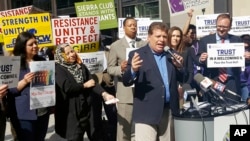Immigrant groups and their allies have joined forces to carry out marches, rallies and protests in cities nationwide next week to mark May Day, saying there's renewed momentum to fight back against Trump administration policies.
Activists in major cities including New York, Chicago and Los Angeles expect tens of thousands of people to participate in Monday demonstrations, starting with morning neighborhood protests and culminating in rush hour events downtown.
Activists also plan an overnight vigil in Phoenix, a farm workers demonstration outside Miami and a White House rally. In Seattle, pro-immigrant events are expected to give way to rowdier, anti-capitalist marches led by protesters who said they plan to shut down a major freeway through the city.
"We're seeing an unprecedented amount of enthusiasm and activity," said New York Immigration Coalition executive director Steven Choi. "It's driven by the fact that Trump administration has made immigration the tip of the spear."
Around the world, union members have traditionally marched on May 1 for workers' rights. In the United States, the event became a rallying point for immigrants in 2006 when more than 1 million people marched against a proposed immigration enforcement bill.
While the current climate surrounding immigration may be similar to 2006 amid President Donald Trump's hard-line approach to the issue, the immigrant rights movement has changed dramatically since then.
Advocacy groups that in 2006 were united in their determination to flood the streets to make a statement have fractured since then and pursued other efforts, such as voter registration, lobbying and fighting deportations.
However, activists expect a surge in participation this year, in part because immigrant rights groups have worked with Women's March participants, Black Lives Matter and Muslim civil rights groups who are united by their opposition to Donald Trump. Also, businesses with immigrant ties are closing or allowing employees to take the day off without penalty.
Immigrant groups acknowledged there is some fear among people in the country illegally who are skittish about drawing attention to themselves in visible marches. But organizers are reminding them that it's an important cause and there's safety in numbers.
"If you are an immigrant in Los Angeles, the safest place you can be on Monday is in the action in downtown Los Angeles," said David Huerta, president of SEIU United Service Workers West.
As Trump approaches his first 100 days, he has aggressively pursued immigration enforcement, including executive orders for a wall along the U.S.-Mexico border and a ban on travelers from six predominantly-Muslim countries. The government has arrested thousands of immigrants in the country illegally and threatened to withhold funding from sanctuary jurisdictions, which limit cooperation between local and federal immigration authorities.
In response, leaders in sanctuary cities have vowed to fight back and civic participation has seen a boost, including February's "Day Without Immigrants." The travel ban and sanctuary order were temporarily halted by legal challenges.
"We will not be divided," Pastor Don Taylor of an interfaith organizing group told Chicago supporters preparing this week for May 1. "It is a moral issue."
Still, while there is opposition to Trump, activists aren't focused on a single course of action.
In Illinois, they're pushing legislative plans to essentially extend sanctuary protections statewide. Outside Miami, advocates are calling for an extension of temporary protected status for Haitians displaced by a deadly 2010 earthquake. In Detroit, the push is for immigrants' constitutional rights, including due process.
In Los Angeles, organizers expect as many as 100,000. New York could see up to 50,000 participants. Chicago organizers estimate at least 20,000. In Pennsylvania, student groups are calling for strikes to demand a safe place for immigrants on campus, while in Las Vegas culinary workers will take to the casino-lined strip to show support.
In the Chicago area, dozens of restaurants and grocery stores planned to either close or allow workers to attend the demonstrations. In Portland, Oregon, unions, immigrants and others are urging people to skip work, school and shopping to highlight the importance of workers and the community's strength.
Elsewhere, union leaders have asked employers to let workers participate. Google, for one, asked managers to be flexible in accommodating requests for time-off so employees can join marches.
Adonis Flores, an organizer with Michigan United, plans to participate for the first time on what's long been known as International Workers Day.
The 28-year-old was brought to the country as a young child from Mexico and doesn't have legal permission to stay. For four years, he's received a work permit through an Obama administration program for young people, and doubts Trump's assurances that his administration won't target people like him for deportation.
"I don't believe anything he says and don't believe anybody should," he said. "It's getting to a point where the community is being tired and ready to take action."
Taxin reported from Santa Ana, California. Astrid Galvan contributed from Phoenix.




